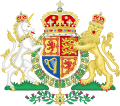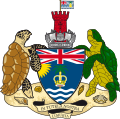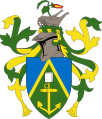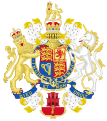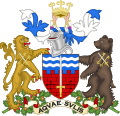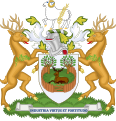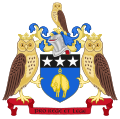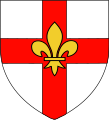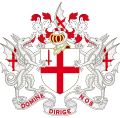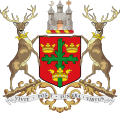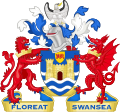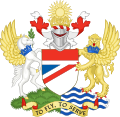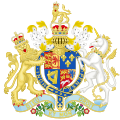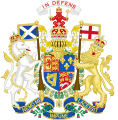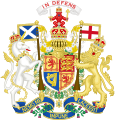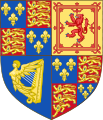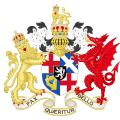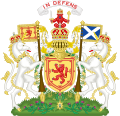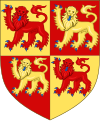Armorial of the United Kingdom
Appearance
This is a list of coats of arms of the United Kingdom, its constituent parts, Crown Dependencies and its Overseas Territories.
United Kingdom
-
Coat of arms of the United Kingdom, for use in Scotland
Countries of the United Kingdom
-
Coat of arms of Northern Ireland (obsolete)
County councils
Government
-
Coat of arms of the United Kingdom used by HM Government
-
Coat of arms of the United Kingdom used by the Scotland Office
-
Royal arms of the United Kingdom used by the Privy Council
-
Coat of arms of the United Kingdom displayed on Acts of Parliament and on British Passports
-
Coat of arms used by the Department for Business and Trade
Crown Dependencies
-
Coat of arms of Guernsey, part of the Bailiwick of Guernsey
-
Coat of arms of Alderney, part of the Bailiwick of Guernsey
-
Coat of arms of Herm, part of the Bailiwick of Guernsey
-
Coat of arms of Sark, part of the Bailiwick of Guernsey
Overseas Territories
-
Akrotiri and Dhekelia do not have their own unique coat of arms. The coat of arms of the United Kingdom is used instead.
Gibraltar
The coat of arms of Gibraltar is the oldest in use in an overseas territory of the United Kingdom and is unique in that it dates from before the period of British colonial administration. The version used by the government of Gibraltar are the same as the royal coat of arms of the United Kingdom combined with a badge featuring the own coat of arms of Gibraltar.
Saint Helena, Ascension and Tristan da Cunha
Saint Helena, Ascension Island and Tristan da Cunha comprise one British Overseas Territory. There is no flag or coat of arms for the entire territory; each of the constituent parts has its own insignia.
Cities
England
Northern Ireland
Scotland
Wales
Institutions
-
Coat of arms of MI5 (Security Service)
-
Coat of arms of the Post Office (state-owned company)
Historical
-
Coat of arms of Great Britain, 1707-1714
-
Coat of arms of Great Britain, 1714-1801
-
Coat of Arms of the United Kingdom, 1801-1816
-
Coat of Arms of the United Kingdom, 1816-1837
-
Coat of Arms of the United Kingdom, 1901-1952
-
Coat of Arms of the United Kingdom, 1952-2022
-
Coat of Arms of Great Britain as used in Scotland, 1707-1714
-
Coat of Arms of Great Britain as used in Scotland, 1714-1801
-
Coat of Arms of the United Kingdom as used in Scotland, 1801-1816
-
Coat of Arms of the United Kingdom as used in Scotland, 1816-1837
-
Coat of Arms of the United Kingdom as used in Scotland, 1837-1952
-
Royal Badge of Wales (1953-2008)
Colonies
-
Coat of arms of Basutoland (1951-1966)
-
Coat of arms of the Cape Colony (1875–1910)
-
Coat of arms of British Guiana (1955-1966)
-
Coat of arms of British Honduras (1907-1967)
-
Coat of arms of British Hong Kong (1959–1997)
-
Coat of arms of the Colony of Natal (1907-1910)
-
Coat of arms of Saint Christopher-Nevis-Anguilla (1958-1967)
-
Coat of arms of the Colony of Saint Lucia (1939-1967)
-
Coat of arms of Southern Rhodesia (1924-1965)
-
Coat of arms of the Colony of Trinidad and Tobago (1958-1962)
-
Coat of arms of the West Indies Federation (1958–1962)
-
Coat of arms of the British Windward Islands (1953-1960)
Predecessor states
England
-
Royal arms of the Kingdom of England, 1399-1603
-
Royal arms of the Kingdom of England, 1603-1649 and 1660-1689
-
Coat of arms of the Commonwealth of England, 1649-1653
-
Coat of arms of The Protectorate, 1653-1659
-
Coat of arms of the Commonwealth of England, Scotland and Ireland, 1659-1660
-
Royal arms of the Kingdom of England, 1689-1694
-
Royal arms of the Kingdom of England, 1694-1702
-
Royal arms of the Kingdom of England, 1702-1707
Ireland
-
Arms of the Lordship of Ireland, 1177-1542
-
Arms of the Kingdom of Ireland, 1542-1801
-
Arms of the Kingdom of Ireland (with crest)
Scotland
-
Royal coat of arms of the Kingdom of Scotland, 1565-1603
-
Royal coat of arms of the Kingdom of Scotland, 1603-1649
Wales
-
Arms of Gwynedd (Principality of Wales), 1240-1282








